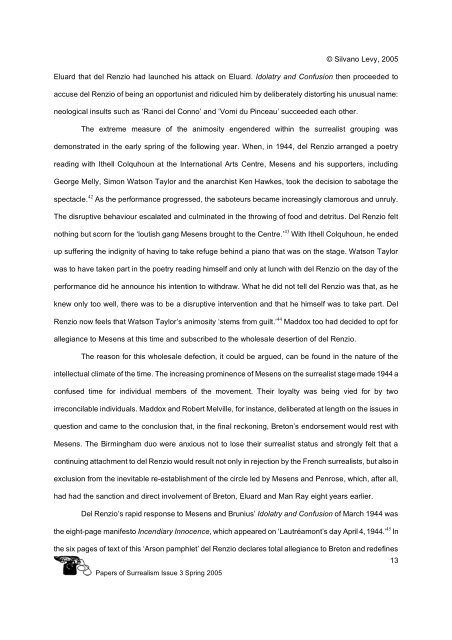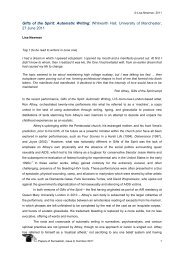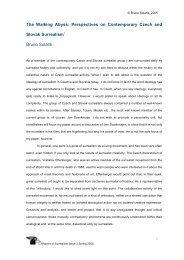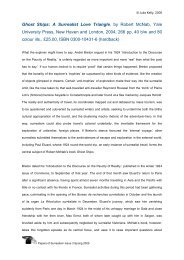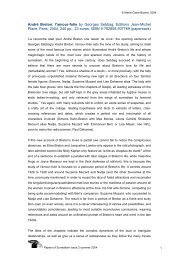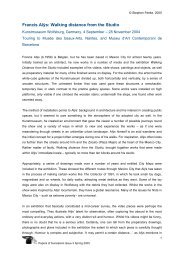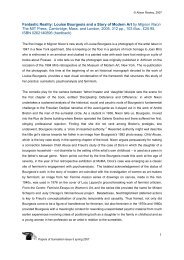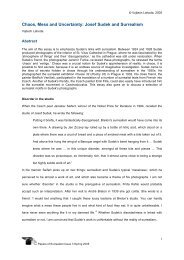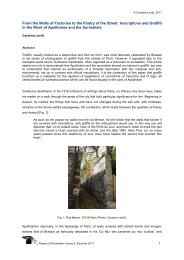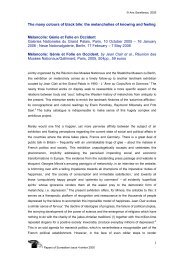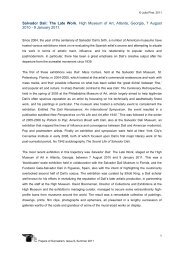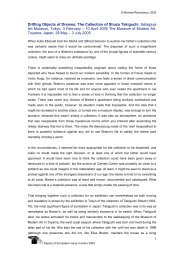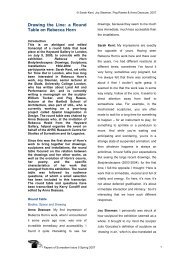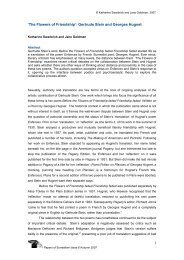The del Renzio Affair: A leadership struggle in wartime surrealism
The del Renzio Affair: A leadership struggle in wartime surrealism
The del Renzio Affair: A leadership struggle in wartime surrealism
Create successful ePaper yourself
Turn your PDF publications into a flip-book with our unique Google optimized e-Paper software.
© Silvano Levy, 2005<br />
Eluard that <strong>del</strong> <strong>Renzio</strong> had launched his attack on Eluard. Idolatry and Confusion then proceeded to<br />
accuse <strong>del</strong> <strong>Renzio</strong> of be<strong>in</strong>g an opportunist and ridiculed him by <strong>del</strong>iberately distort<strong>in</strong>g his unusual name:<br />
neological <strong>in</strong>sults such as ‘Ranci <strong>del</strong> Conno’ and ‘Vomi du P<strong>in</strong>ceau’ succeeded each other.<br />
<strong>The</strong> extreme measure of the animosity engendered with<strong>in</strong> the surrealist group<strong>in</strong>g was<br />
demonstrated <strong>in</strong> the early spr<strong>in</strong>g of the follow<strong>in</strong>g year. When, <strong>in</strong> 1944, <strong>del</strong> <strong>Renzio</strong> arranged a poetry<br />
read<strong>in</strong>g with Ithell Colquhoun at the International Arts Centre, Mesens and his supporters, <strong>in</strong>clud<strong>in</strong>g<br />
George Melly, Simon Watson Taylor and the anarchist Ken Hawkes, took the decision to sabotage the<br />
spectacle. 42 As the performance progressed, the saboteurs became <strong>in</strong>creas<strong>in</strong>gly clamorous and unruly.<br />
<strong>The</strong> disruptive behaviour escalated and culm<strong>in</strong>ated <strong>in</strong> the throw<strong>in</strong>g of food and detritus. Del <strong>Renzio</strong> felt<br />
noth<strong>in</strong>g but scorn for the ‘loutish gang Mesens brought to the Centre.’ 43 With Ithell Colquhoun, he ended<br />
up suffer<strong>in</strong>g the <strong>in</strong>dignity of hav<strong>in</strong>g to take refuge beh<strong>in</strong>d a piano that was on the stage. Watson Taylor<br />
was to have taken part <strong>in</strong> the poetry read<strong>in</strong>g himself and only at lunch with <strong>del</strong> <strong>Renzio</strong> on the day of the<br />
performance did he announce his <strong>in</strong>tention to withdraw. What he did not tell <strong>del</strong> <strong>Renzio</strong> was that, as he<br />
knew only too well, there was to be a disruptive <strong>in</strong>tervention and that he himself was to take part. Del<br />
<strong>Renzio</strong> now feels that Watson Taylor’s animosity ‘stems from guilt.’ 44 Maddox too had decided to opt for<br />
allegiance to Mesens at this time and subscribed to the wholesale desertion of <strong>del</strong> <strong>Renzio</strong>.<br />
<strong>The</strong> reason for this wholesale defection, it could be argued, can be found <strong>in</strong> the nature of the<br />
<strong>in</strong>tellectual climate of the time. <strong>The</strong> <strong>in</strong>creas<strong>in</strong>g prom<strong>in</strong>ence of Mesens on the surrealist stage made 1944 a<br />
confused time for <strong>in</strong>dividual members of the movement. <strong>The</strong>ir loyalty was be<strong>in</strong>g vied for by two<br />
irreconcilable <strong>in</strong>dividuals. Maddox and Robert Melville, for <strong>in</strong>stance, <strong>del</strong>iberated at length on the issues <strong>in</strong><br />
question and came to the conclusion that, <strong>in</strong> the f<strong>in</strong>al reckon<strong>in</strong>g, Breton’s endorsement would rest with<br />
Mesens. <strong>The</strong> Birm<strong>in</strong>gham duo were anxious not to lose their surrealist status and strongly felt that a<br />
cont<strong>in</strong>u<strong>in</strong>g attachment to <strong>del</strong> <strong>Renzio</strong> would result not only <strong>in</strong> rejection by the French surrealists, but also <strong>in</strong><br />
exclusion from the <strong>in</strong>evitable re-establishment of the circle led by Mesens and Penrose, which, after all,<br />
had had the sanction and direct <strong>in</strong>volvement of Breton, Eluard and Man Ray eight years earlier.<br />
Del <strong>Renzio</strong>’s rapid response to Mesens and Brunius’ Idolatry and Confusion of March 1944 was<br />
the eight-page manifesto Incendiary Innocence, which appeared on ‘Lautréamont’s day April 4, 1944.’ 45 In<br />
the six pages of text of this ‘Arson pamphlet’ <strong>del</strong> <strong>Renzio</strong> declares total allegiance to Breton and redef<strong>in</strong>es<br />
13<br />
Papers of Surrealism Issue 3 Spr<strong>in</strong>g 2005


